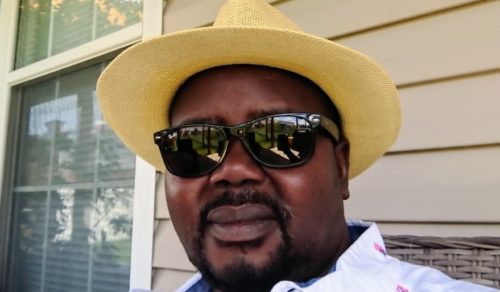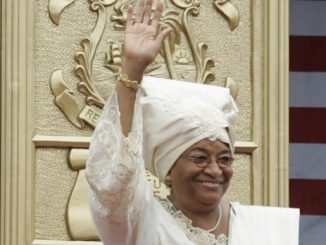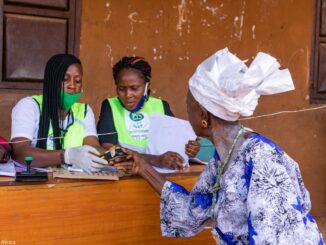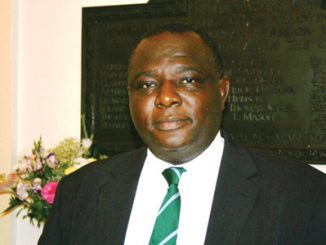
By Abdulai Mansaray
It is estimated that about 170 million people make up the African diaspora. But Africa is yet to unleash the full potential of this group on the continent. Despite the cultural and economic contributions of diasporas, they are often treated as foreigners in their adopted homes and as traitors in their places of birth.

The common term for diasporas is “immigrants”, another name for “you’re not welcome here”. “Some see the diaspora as a series of destinations with no meaningful expanses between them. It is this duality that leaves many feeling straddled between two or more cultures. In some cases, it feels like falling between two stools.
Unfortunately, the economic contribution of diasporas to the African continent is rarely spoken of. The contribution of the remittances to the GDP of African countries remain underreported. African leaders rarely acknowledge this financial dependence, for fear of empowering diasporas in politics.
According to the World Bank, Global remittances to the sub-Saharan Africa grew by 10% to $46 Billion in 2018. You would expect resources from this group to be carefully tapped.
The majority of most diasporas hope that the potentials gained from exposure, experiences and education overseas can be brought back home encouragingly and be deployed for the betterment of their homelands, so that the next generation of Africans and the generations after them will not have to leave home to find better education and better life elsewhere.
To all intents and purposes, the diaspora might just be the card Africa has hidden under her sleeve for far too long. But how many African leaders are making such efforts to tap into these reservoirs of human resources? How many are making conditions for diasporas to return home and contribute to their respective communities? How many are making these homes safe for their hustlers to bring back the hustle? How many are making it worth the effort?
The African Union Commission defines the African diaspora as “peoples of African origin living outside the continent, irrespective of their citizenship and nationality … who are willing to contribute to the development of the continent and the building of the African Union’. The Commission considers the diaspora the continent’s ‘sixth region’ after the East, West, North, Central region and South”; and that includes Sierra Leoneans. You cannot underestimate the contribution of Sierra Leoneans to the national GDP.
Understandably, Sierra Leoneans in the diaspora have always been in tune with the politics back home. But unlike other countries who provide opportunities for their citizens abroad to participate in their political system by voting, the nearest Sierra Leoneans can do so is by making financial contributions to their chosen political parties. There are also chapters and political organisations to mimic their parent parties back home.
But in recent times, the emergence of these rival groups has descended into propaganda war machines; a sad reflection of what’s happening on the ground. And thanks to social media, it is becoming an out of control past time.
Recent posts on social media by supporters of the APC and SLPP parties have descended into the basement of human comprehension. No one is denying that our country is going through tough times. No one is denying that the Bio government has a lot to do, to live up to the expectations of Sierra Leoneans. The standard and cost of living have been unacceptable for a very long time in our history. But the daily promotion of violence, hate, war and unrest on social media, especially from Diasporas is unfathomable.
What makes it more disheartening is the fact that most of us in the diaspora, are a direct consequence of the decade war in our country. If anyone should know the consequences of war, the diasporas should be prime specimens.
But it is becoming increasingly common that most diasporas would rather spend the lockdown time spewing out messages of hate and violence, than to think of better ways to tackle our unending problems back home. It is a sad state of affairs that such base instincts are now considered as badges of honour by some people. Have we forgotten so soon?
Many of us would have come with lofty dreams of a paradise, only to find out that it is not all what it is cranked up to be. But that is no justification for praying and promoting violence to send our country deeper into the jaws of destruction.
Some of us may be content with our jobs as cleaners, cab drivers, grave diggers, security or janitors. Others are content that they work for their local authorities as social workers, teachers, nurses and so on and so forth. Just because you can eat mayonnaise and KFC, sleep in an airconditioned room and drive a nice car, is no guarantee from the consequences of violence and war back home. No matter how bad our country is, no matter how poor, no matter how corrupt and underdeveloped, it is the only place where everybody knows your name, and they call it home.
Despite the positive contributions we make in our adopted homelands, how many times have we been told to GO BACK HOME? Have we forgotten that no matter how well we swim beside the crocodile, he is still not our brother?
In spite of all the difficulties our country is facing, have people forgotten what it feels like to go where everybody knows your name? When people pray for and incite war in our country, do they forget that war is not discriminatory? Have they forgotten that the decade long civil was an equal opportunities employer with machetes, bullets and bombs? What kind of hate drives a person to wish war on his own people?
It is understandable if some diasporas feel that they are better off than those back home. You may be able to afford the finer things in life as compared to the average person back home. You can afford the latest car, the biggest house, an overflowing refrigerator, a large selection of shoes and stuffed wardrobes. But remember that the best things in life are free. One of those freebies is happiness. The village guy in Gbangbatoke may not be as “RICH” as the better off in New York, London or Amsterdam. But maybe, just maybe, he is 99.9% happier most of the time.
Peace cannot be achieved through violence; it can only be attained through understanding. You cannot drive darkness out of darkness. Violence, war, and riots have never resolved any problem. All the wars in the world have always ended around the table. Those who want violence and war always enter into a logic of destruction.
Regardless of your cause, violence is a disease that corrupts all those who use it. Being in the diaspora can sometimes feel like being in a chain gang. If we break the chain, we free ourselves. But if we cut our roots, we die.
With all the experiences, the education, the exposure, the best one can hope for is to be able to go where everybody knows your name. Some call it home. So please, it’s time we stop calling for violence, war, and unrest in Sierra Leone – with all the inherent consequences.
Our country is not what we all want it to be. If it is not for corruption and misrule, the majority of Sierra Leoneans will not be far flung across the globe as we are today. Today’s modern slavery, as symbolised by credit cards, car loans, mortgages, alimonies, child maintenance, utility bills, parking tickets, etc cannot be solved by calling for violence and war back home.
As diasporas, let us not take out the stresses of being in the West on our only home called Salone, by wishing violence and war. The hope and prayer is that Allah, Jehovah, God and Yahweh will spare our country from the wishful thinking of some people.
God Bless Salone. Don’t forget to turn the lights off when you leave the room.
The common term for diasporas is “immigrants”, another name for “you’re not welcome here”. “Some see the diaspora as a series of destinations with no meaningful expanses between them. It is this duality that leaves many feeling straddled between two or more cultures. In some cases, it feels like falling between two stools.
Unfortunately, the economic contribution of diasporas to the African continent is rarely spoken of. The contribution of the remittances to the GDP of African countries remain underreported. African leaders rarely acknowledge this financial dependence, for fear of empowering diasporas in politics.
According to the World Bank, Global remittances to the sub-Saharan Africa grew by 10% to $46 Billion in 2018. You would expect resources from this group to be carefully tapped.
The majority of most diasporas hope that the potentials gained from exposure, experiences and education overseas can be brought back home encouragingly and be deployed for the betterment of their homelands, so that the next generation of Africans and the generations after them will not have to leave home to find better education and better life elsewhere.
To all intents and purposes, the diaspora might just be the card Africa has hidden under her sleeve for far too long. But how many African leaders are making such efforts to tap into these reservoirs of human resources? How many are making conditions for diasporas to return home and contribute to their respective communities? How many are making these homes safe for their hustlers to bring back the hustle? How many are making it worth the effort?
The African Union Commission defines the African diaspora as “peoples of African origin living outside the continent, irrespective of their citizenship and nationality … who are willing to contribute to the development of the continent and the building of the African Union’. The Commission considers the diaspora the continent’s ‘sixth region’ after the East, West, North, Central region and South”; and that includes Sierra Leoneans. You cannot underestimate the contribution of Sierra Leoneans to the national GDP.
Understandably, Sierra Leoneans in the diaspora have always been in tune with the politics back home. But unlike other countries who provide opportunities for their citizens abroad to participate in their political system by voting, the nearest Sierra Leoneans can do so is by making financial contributions to their chosen political parties. There are also chapters and political organisations to mimic their parent parties back home.
But in recent times, the emergence of these rival groups has descended into propaganda war machines; a sad reflection of what’s happening on the ground. And thanks to social media, it is becoming an out of control past time.
Recent posts on social media by supporters of the APC and SLPP parties have descended into the basement of human comprehension. No one is denying that our country is going through tough times. No one is denying that the Bio government has a lot to do, to live up to the expectations of Sierra Leoneans. The standard and cost of living have been unacceptable for a very long time in our history. But the daily promotion of violence, hate, war and unrest on social media, especially from Diasporas is unfathomable.
What makes it more disheartening is the fact that most of us in the diaspora, are a direct consequence of the decade war in our country. If anyone should know the consequences of war, the diasporas should be prime specimens.
But it is becoming increasingly common that most diasporas would rather spend the lockdown time spewing out messages of hate and violence, than to think of better ways to tackle our unending problems back home. It is a sad state of affairs that such base instincts are now considered as badges of honour by some people. Have we forgotten so soon?
Many of us would have come with lofty dreams of a paradise, only to find out that it is not all what it is cranked up to be. But that is no justification for praying and promoting violence to send our country deeper into the jaws of destruction.
Some of us may be content with our jobs as cleaners, cab drivers, grave diggers, security or janitors. Others are content that they work for their local authorities as social workers, teachers, nurses and so on and so forth. Just because you can eat mayonnaise and KFC, sleep in an airconditioned room and drive a nice car, is no guarantee from the consequences of violence and war back home. No matter how bad our country is, no matter how poor, no matter how corrupt and underdeveloped, it is the only place where everybody knows your name, and they call it home.
Despite the positive contributions we make in our adopted homelands, how many times have we been told to GO BACK HOME? Have we forgotten that no matter how well we swim beside the crocodile, he is still not our brother?
In spite of all the difficulties our country is facing, have people forgotten what it feels like to go where everybody knows your name? When people pray for and incite war in our country, do they forget that war is not discriminatory? Have they forgotten that the decade long civil was an equal opportunities employer with machetes, bullets and bombs? What kind of hate drives a person to wish war on his own people?
It is understandable if some diasporas feel that they are better off than those back home. You may be able to afford the finer things in life as compared to the average person back home. You can afford the latest car, the biggest house, an overflowing refrigerator, a large selection of shoes and stuffed wardrobes. But remember that the best things in life are free. One of those freebies is happiness. The village guy in Gbangbatoke may not be as “RICH” as the better off in New York, London or Amsterdam. But maybe, just maybe, he is 99.9% happier most of the time.
Peace cannot be achieved through violence; it can only be attained through understanding. You cannot drive darkness out of darkness. Violence, war, and riots have never resolved any problem. All the wars in the world have always ended around the table. Those who want violence and war always enter into a logic of destruction.
Regardless of your cause, violence is a disease that corrupts all those who use it. Being in the diaspora can sometimes feel like being in a chain gang. If we break the chain, we free ourselves. But if we cut our roots, we die.
With all the experiences, the education, the exposure, the best one can hope for is to be able to go where everybody knows your name. Some call it home. So please, it’s time we stop calling for violence, war, and unrest in Sierra Leone – with all the inherent consequences.
Our country is not what we all want it to be. If it is not for corruption and misrule, the majority of Sierra Leoneans will not be far flung across the globe as we are today. Today’s modern slavery, as symbolised by credit cards, car loans, mortgages, alimonies, child maintenance, utility bills, parking tickets, etc cannot be solved by calling for violence and war back home.
As diasporas, let us not take out the stresses of being in the West on our only home called Salone, by wishing violence and war. The hope and prayer is that Allah, Jehovah, God and Yahweh will spare our country from the wishful thinking of some people.
God Bless Salone. Don’t forget to turn the lights off when you leave the room.
It is estimated that about 170 million people make up the African diaspora. But Africa is yet to unleash the full potential of this group on the continent. Despite the cultural and economic contributions of diasporas, they are often treated as foreigners in their adopted homes and as traitors in their places of birth.
The common term for diasporas is “immigrants”, another name for “you’re not welcome here”. “Some see the diaspora as a series of destinations with no meaningful expanses between them. It is this duality that leaves many feeling straddled between two or more cultures. In some cases, it feels like falling between two stools.
Unfortunately, the economic contribution of diasporas to the African continent is rarely spoken of. The contribution of the remittances to the GDP of African countries remain underreported. African leaders rarely acknowledge this financial dependence, for fear of empowering diasporas in politics.
According to the World Bank, Global remittances to the sub-Saharan Africa grew by 10% to $46 Billion in 2018. You would expect resources from this group to be carefully tapped.
The majority of most diasporas hope that the potentials gained from exposure, experiences and education overseas can be brought back home encouragingly and be deployed for the betterment of their homelands, so that the next generation of Africans and the generations after them will not have to leave home to find better education and better life elsewhere.
To all intents and purposes, the diaspora might just be the card Africa has hidden under her sleeve for far too long. But how many African leaders are making such efforts to tap into these reservoirs of human resources? How many are making conditions for diasporas to return home and contribute to their respective communities? How many are making these homes safe for their hustlers to bring back the hustle? How many are making it worth the effort?
The African Union Commission defines the African diaspora as “peoples of African origin living outside the continent, irrespective of their citizenship and nationality … who are willing to contribute to the development of the continent and the building of the African Union’. The Commission considers the diaspora the continent’s ‘sixth region’ after the East, West, North, Central region and South”; and that includes Sierra Leoneans. You cannot underestimate the contribution of Sierra Leoneans to the national GDP.
Understandably, Sierra Leoneans in the diaspora have always been in tune with the politics back home. But unlike other countries who provide opportunities for their citizens abroad to participate in their political system by voting, the nearest Sierra Leoneans can do so is by making financial contributions to their chosen political parties. There are also chapters and political organisations to mimic their parent parties back home.
But in recent times, the emergence of these rival groups has descended into propaganda war machines; a sad reflection of what’s happening on the ground. And thanks to social media, it is becoming an out of control past time.
Recent posts on social media by supporters of the APC and SLPP parties have descended into the basement of human comprehension. No one is denying that our country is going through tough times. No one is denying that the Bio government has a lot to do, to live up to the expectations of Sierra Leoneans. The standard and cost of living have been unacceptable for a very long time in our history. But the daily promotion of violence, hate, war and unrest on social media, especially from Diasporas is unfathomable.
What makes it more disheartening is the fact that most of us in the diaspora, are a direct consequence of the decade war in our country. If anyone should know the consequences of war, the diasporas should be prime specimens.
But it is becoming increasingly common that most diasporas would rather spend the lockdown time spewing out messages of hate and violence, than to think of better ways to tackle our unending problems back home. It is a sad state of affairs that such base instincts are now considered as badges of honour by some people. Have we forgotten so soon?
Many of us would have come with lofty dreams of a paradise, only to find out that it is not all what it is cranked up to be. But that is no justification for praying and promoting violence to send our country deeper into the jaws of destruction.
Some of us may be content with our jobs as cleaners, cab drivers, grave diggers, security or janitors. Others are content that they work for their local authorities as social workers, teachers, nurses and so on and so forth. Just because you can eat mayonnaise and KFC, sleep in an airconditioned room and drive a nice car, is no guarantee from the consequences of violence and war back home. No matter how bad our country is, no matter how poor, no matter how corrupt and underdeveloped, it is the only place where everybody knows your name, and they call it home.
Despite the positive contributions we make in our adopted homelands, how many times have we been told to GO BACK HOME? Have we forgotten that no matter how well we swim beside the crocodile, he is still not our brother?
In spite of all the difficulties our country is facing, have people forgotten what it feels like to go where everybody knows your name? When people pray for and incite war in our country, do they forget that war is not discriminatory? Have they forgotten that the decade long civil was an equal opportunities employer with machetes, bullets and bombs? What kind of hate drives a person to wish war on his own people?
It is understandable if some diasporas feel that they are better off than those back home. You may be able to afford the finer things in life as compared to the average person back home. You can afford the latest car, the biggest house, an overflowing refrigerator, a large selection of shoes and stuffed wardrobes. But remember that the best things in life are free. One of those freebies is happiness. The village guy in Gbangbatoke may not be as “RICH” as the better off in New York, London or Amsterdam. But maybe, just maybe, he is 99.9% happier most of the time.
Peace cannot be achieved through violence; it can only be attained through understanding. You cannot drive darkness out of darkness. Violence, war, and riots have never resolved any problem. All the wars in the world have always ended around the table. Those who want violence and war always enter into a logic of destruction.
Regardless of your cause, violence is a disease that corrupts all those who use it. Being in the diaspora can sometimes feel like being in a chain gang. If we break the chain, we free ourselves. But if we cut our roots, we die.
With all the experiences, the education, the exposure, the best one can hope for is to be able to go where everybody knows your name. Some call it home. So please, it’s time we stop calling for violence, war, and unrest in Sierra Leone – with all the inherent consequences.
Our country is not what we all want it to be. If it is not for corruption and misrule, the majority of Sierra Leoneans will not be far flung across the globe as we are today. Today’s modern slavery, as symbolised by credit cards, car loans, mortgages, alimonies, child maintenance, utility bills, parking tickets, etc cannot be solved by calling for violence and war back home.
As diasporas, let us not take out the stresses of being in the West on our only home called Salone, by wishing violence and war. The hope and prayer is that Allah, Jehovah, God and Yahweh will spare our country from the wishful thinking of some people.
God Bless Salone. Don’t forget to turn the lights off when you leave the room.



